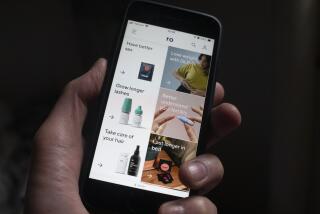Insurers Boosting Customer Service
- Share via
Cutting inscrutable health insurance jargon out of their communications. Opening retail stores to answer people’s questions and offer wellness classes. Measuring customer-service efforts to give callers a better experience.
More insurance carriers are ramping up their services as they prepare to compete for millions of new customers starting in 2014, as a result of the new healthcare-reform law. That’s the year health insurers will be barred from refusing coverage to people with preexisting conditions or charging them exorbitant rates, and the first time individuals will have to carry health insurance or face a financial penalty.
Such changes are driving some health insurers to try to meet people where they are—physically, with retail stores and enhanced phone-based customer service, and virtually, by tracking negative comments online and intervening to help improve people’s experiences with their health plans.
“We see the stakes in terms of customer service going higher and higher,” said Joe Mondy, a spokesman for Cigna.
The arrival of a new era in healthcare has Highmark Inc., a Blue Cross Blue Shield carrier in western and central Pennsylvania, broadening its focus beyond just acquiring new customers, said Matt Fidler, director of retail marketing for Highmark in Pittsburgh.
The company has attracted 20,000 visitors to its first two Highmark Direct retail stores since opening them in March 2009, he said. It’s planning to open three more storefront operations in Pittsburgh and one in Harrisburg by September.
Highmark Direct stores offer a self-service area with kiosks and machines to take simple health measurements, plus convertible classrooms and places where people can ask questions and work with staff on coverage or billing problems they may have. In the future, the stores may draw health-plan customers for wellness classes in such subjects as smoking cessation or prenatal yoga.
People already use the stores to wade through the intricacies of plan designs, particularly high-deductible health plans and health savings accounts, Fidler said.
“Folks are confused now about health insurance,” he said. “It’s going to get more confusing with reform before the tide turns.”
Under the health-reform law signed by President Obama in March, by 2019 about 24 million Americans will gain health insurance by buying private coverage in regulated marketplaces called exchanges, according to estimates from the Congressional Budget Office.
In 2014, many people without employer coverage who earn too much to qualify for an expanded Medicaid program will be able to buy their own health insurance through the exchanges, said Sara Collins, a vice president at the Commonwealth Fund, a private foundation in New York. Premium subsidies to make it more affordable will be available for those with income of up to 400% of the federal poverty level, or about $88,000 a year for a family of four.
“You’re required by 2014 to have insurance, so the onus is going to be on individuals to find coverage if they don’t have it,” she said. “There will be a lot of federal dollars flowing through the exchanges to help people buy coverage.”
In three years, health plans will look more uniform as an essential benefits package takes effect in the exchanges; that package will vary mostly by cost-sharing levels as opposed to covered services. Among four types, the bronze plan, for example, may carry a higher deductible in exchange for a lower premium, while consumers who want more protection upfront may find the opposite benefit design in the platinum plan.
With those changes approaching, many insurers are trying to stand apart from their rivals as they offer increasingly similar products, experts say.
“Payers will definitely have to become more member-centric to differentiate on the member experience itself because the actual plans they provide will become commoditized,” said Ralph Alewine, principal with Booz & Co. in Atlanta. “We foresee the day coming very soon where payers will start to advertise their ranking in customer service” surveys akin to what life insurers do.
More to Read
Inside the business of entertainment
The Wide Shot brings you news, analysis and insights on everything from streaming wars to production — and what it all means for the future.
You may occasionally receive promotional content from the Los Angeles Times.










